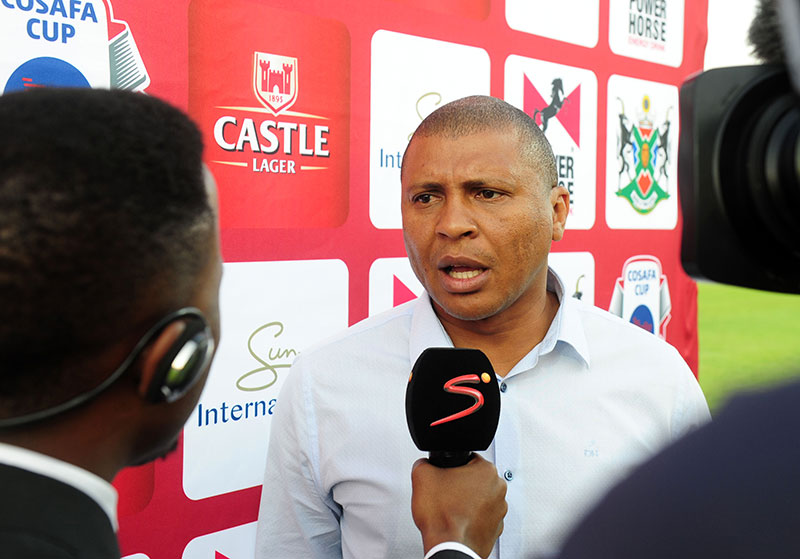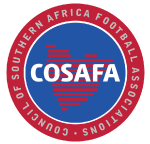
Ricardo Mannetti – Namibia coach Q&A
Ricardo Mannetti led Namibia to the COSAFA Castle Cup title in South Africa last year, providing the country with one of the greatest days in their history on the football pitch.
He remains in charge for the defence of their title on home soil from June 11-25, when he will seek to engineer a rare feat of back-to-back COSAFA Castle Cup wins.
Mannetti spent a decade playing in South Africa’s Premier Soccer League with Santos and Bush Bucks, and was also part of the Namibia squad at the 1998 African Nations Cup finals.
At the age of 40, he is now one of the brightest young coaches in the African game as he seeks to elevate the status of the Brave Warriors even higher.
He reveals his coaching philosophy and what he looks for in his players.
COSAFA: Did you always want to be a coach after your playing days?
Mannetti: I never wanted to be a coach! I never used to play any games in terms of PlayStation or whatever, and my brother came with a game called Football Manager. And I said, “no, I don’t like this game, I never want to manage a team”. This was during my playing days and after about two years, my brother said to me, “I think you can make a very good coach, you have the charisma, the x-factor and stuff”, and I was always fighting it. After I retired in 2006 at Bush Bucks, I came back to Namibia and went straight into a coaching job at Civics. They were facing relegation and as an ex-player I had to help my team. I was actually forced into it because there was no one else to see the team. Two or three seasons prior to that they were triple league champions, so I thought I would give it a shot. I won the NFA Cup in the first season, then ended up second after fighting relegation. I then got an offer from Black Africa, who are a bigger club, and I took on that project to rebuild the team. Then I took the job as the national Under-20 coach and got to the COSAFA Under-20 final [in 2009]. My bosses liked the work I was doing there.
Who was your coaching inspiration when your were playing?
My very first coach was called Brian Isaacs, I played with him and he coached me. He later won the triple league title with Black Africa and also took me to the national team, so locally in Namibia, it would be him. Then internationally we had Heinz-Peter Überjahn from Germany, I learnt a lot from him. During my time in South Africa I was coached by Clive Barker, Muhsin Ertugral, Boebie Solomons and Gordon Igesund, to name a few, and I would say my coaching style is a little bit of all of those guys. You look at Muhsin, he is a very strict guy when it comes to coaching, he is very good at training, then you find Gordon is very good at assembling a team and preparing a team mentally. Then there is the big motivator in Clive that can make you beat a Goliath, even if you are David. I have learnt from those guys, I decided to mix that with my own style.
What would your style be?
That is a broad concept, but for me I am a firm believer that a player should enjoy playing football. He should look forward to going to training, he should look forward to playing a match at the weekend. Around that, I base my exercises and philosophy, my entire coaching. If I find that my players don’t enjoy certain things then I have to go back to the drawing board and change my tactics. I am not talking about not being structured or disciplined, you can still win and enjoy.
You went very quickly from being a player to a coach at international level. Did being a former player help you on that journey?
It has pros and cons. Everyone says not all footballers make good coaches, but the opposite is also true. At the end of the day, a guy like me has the edge in terms of player commitment to understand the chemistry of the team. If you are intellectual, sometimes you miss that chemistry and the harmony. I can go to training and look into my boy’s eyes and look in their eyes and know what they are going through. That is what my experience as a player can do. I can see some are frightened, some are over-confident, but I am always very relaxed to create the right balance and harmony in the team.
What do you look for most in a player?
In international football and the modern game, talent and skill is the last thing you look at. I want my players to be mentally tough, to be physically well prepared. That is priority for me. The talent and skill, passing and whatnot, we can all do that. We can all drive a car, but at the end of the day it doesn’t mean you are a Formula 1 driver. That is what international football is about.

